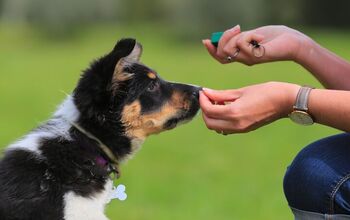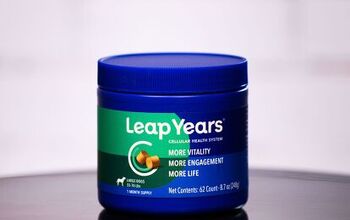Does My Dog Need Vitamins And Supplements?

If you’re wondering whether your dog needs to be given any additional vitamins or supplements, the answer is “Probably not.” A pooch who’s fed a well-balanced diet shouldn’t need any extra help to get the right nutrition, but there are cases where some dogs may benefit from vitamins and supplements. As such, it’s best to look at the specifics and decide whether your pup needs any.
Vitamins in Commercial Dog Food
A high-quality commercial dog food should contain all the vitamins and minerals that your dog needs. However, different brands of dog foods can contain varying amounts of vitamins, which can be a cause for confusion. If you’re unsure whether your pup’s food is providing her with the correct amount of vitamins and minerals, consult your veterinarian.
Related: Well Balanced Pet Mineral Analysis Test Kit Review
Vitamins in Homemade Dog Food
If you choose to feed your dog a home cooked diet, this is where things can get a bit trickier. Your dog may require some additional vitamins or supplements to ensure that she’s getting everything that she needs from her diet. However, since the nutritional content of your dog’s homemade meals can vary wildly depending on what you’re feeding her, it’s not as simple as just cooking her a meal and then adding a multivitamin. You may benefit from seeing a vet or a doggy nutritionist to help you out with creating a balanced diet for your pup. You’ll need to find out what levels of vitamins and other nutrients your dog needs, then figure out the nutritional content of each meal (there are online tools that can help you with this) and supplement vitamins as necessary.
What About Supplements?
There are all kinds of supplements that can be given to dogs, for a vast range of purposes. Some dogs absolutely benefit from having supplements to their food, but an average young, healthy dog doesn’t really need any. Common supplements for dogs include omega fatty acids, which are said to be good for ailments such as arthritis and skin allergies, and probiotics, which aid digestion. If your dog has an issue that you think might respond to supplements, there’s no reason not to give it a go.
Related: What Supplements Should I Give My Puppy?
Can Vitamins and Supplements be Bad for My Dog?
While most vitamins and supplements are generally either helpful or benign, it’s definitely possible to have too much of a good thing. Excessive amounts of calcium in a dog’s diet can lead to skeletal problems, especially if fed to large breed dogs before reaching maturity. Too much vitamin a can cause blood vessel damage and arthritis in dogs. Large amounts of vitamin D can cause muscle atrophy and loss of appetite. So, if you are going to add with vitamins or other supplements to your dog’s diet, it’s a good idea to consult your vet to make sure you’re giving the correct dosage. It’s also essential you avoid giving human vitamins and stick to the kind made specifically for canines. This is because vitamins and supplements designed for human consumption may be too potent or contain added ingredients that aren’t safe for dogs.

Lauren Corona is a freelance writer from merry old England. She specializes in writing about dogs and other critters. Lauren lives near Oxford, with her gorgeous Doberman, Nola. When she's not tapping away at the keyboard, you'll find her walking in the woods with Nola-dog, raising money for the Oxfordshire Animal Sanctuary, cooking vegan food, making zines and writing about herself in the third person.
More by Lauren Corona






















